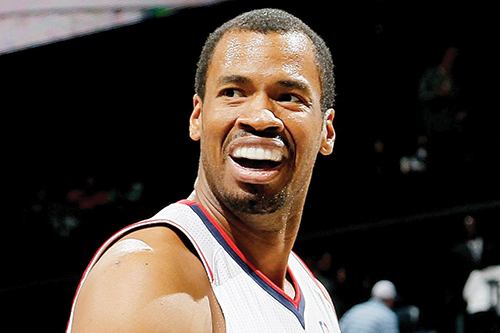Who would’ve guessed that the story to break up ESPN’s front-page love affair with the Lakers would be about an NBA player coming out of the closet? And that the response from players, coaches and fans would be generally extremely positive and supportive? Regardless of whether or not you’re still in a deep depression after the Lakers were swept out of the playoffs, it’s tough not to feel uplifted by the story.
Jason Collins ushers in a new era

Who would’ve guessed that the story to break up ESPN’s front-page love affair with the Lakers would be about an NBA player coming out of the closet? And that the response from players, coaches and fans would be generally extremely positive and supportive? Regardless of whether or not you’re still in a deep depression after the Lakers were swept out of the playoffs, it’s tough not to feel uplifted by the story.
Jason Collins, a 12-year NBA veteran who is currently a free agent, came out in a
Sports Illustrated article that was posted on the magazine’s website this past Monday. It was an incredibly brave statement to make considering that he is the first active player in one of the four major American professional sports (baseball, basketball, football and hockey) to publicly announce that he is gay. There have been a few retired athletes that have come out, including MLB’s Billy Bean (not to be confused with Oakland A’s general manager Billy Beane) and NBA player John Amaechi, both of whom have expressed their support for Collins. But making such a revelation while still in the public eye as an active member of one of the most high-profile sports entertainment businesses is a different matter altogether.
While it may have taken 100-plus years for an athlete to come out in a major American sports league, the attitude towards the lesbian, gay, bisexual and transgender community in sports has shifted dramatically in the past few years. Recently, the NHL announced that the league and the players association have joined up with the You Can Play Project, an advocate group set on combating homophobia in sports. In 2011, Columbia University wrestling coach Hudson Taylor created Athlete Ally, a nonprofit organization whose goal is to “encourage athletes, coaches, parents, fans and other members of the sports community to respect all individuals involved in sports.” Some of their members include Minnesota Vikings punter Chris Kluwe, Denver Nuggets forward Kenneth Faried and Philadelphia Eagles linebacker Connor Barwin.
The surprise to many was that after Collins’ announcement there was an absolute torrent of well-wishes from the sports community. The NBA was especially thoughtful, with the likes of Kobe Bryant, Steve Nash, Dwyane Wade and Commissioner David Stern all applauding Collins for his courage. Collins also got plenty of support on the political front, as Bill Clinton and President Barack Obama both expressed their heartfelt appreciation.
However, the biggest shock to me was when ESPN NBA analyst Chris Broussard went on the air and described homosexuality as a sin, condemning Collins for his sexual orientation. Though Broussard certainly isn’t alone in his sentiment, his ignorant and negative comments stood out against the outpouring of encouragement that greeted Collins after the announcement, and the backlash was swift.
Rather than highlight the unfortunate attitude of many regarding homosexuality, the anger against Broussard’s ridiculous remark confirms an ongoing evolution in sports, past antiquated and simplistic notions of masculinity and into an era of tolerance toward different lifestyles.
With Collins coming to the end of his career, it remains to be seen whether an NBA team will decided to offer him a new contract, but his simple act broke what is effectively one of the last unwritten barriers in sports. Although he has since stated that he didn’t wish to draw attention to himself for being “different,” he has undoubtedly situated himself as a groundbreaking figure in sports history and, more importantly, given those who are struggling with their sexual identity someone to admire.





